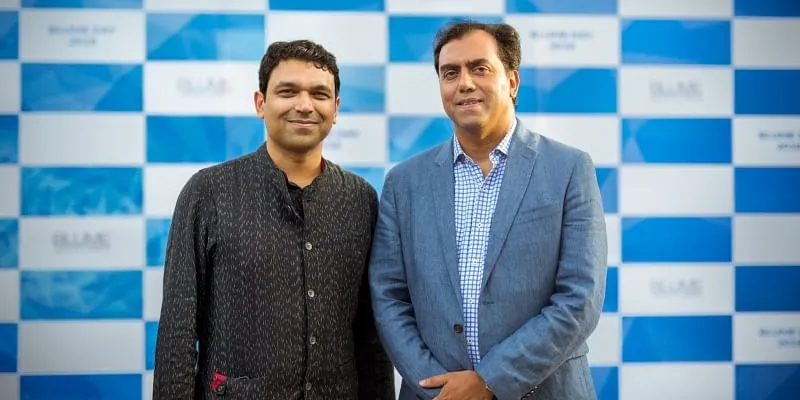[TechSparks 2020] Market wasn't ready to absorb $3-5 million cheques then: Blume Ventures on its ‘micro VC’ origins
At TechSparks 2020, Blume Ventures Co-founders Karthik Reddy and Sanjay Nath joined YourStory Founder and CEO Shradha Sharma for a fireside chat to recap their 10-year journey in startup financing, the things it got right and wrong, and what the next decade has in store for VCs in India.
Blume Ventures needs no introduction in India’s startup ecosystem.
With over 145 investments and $230 million in assets under management (AUM) across three funds in 10 years, it is arguably one of the most prolific and trusted early-stage VCs in India. However, Co-founders and Managing Partners Karthik Reddy and Sanjay Nath are acutely aware that the decade until 2030 is going to be vastly different than the last one.
New challenges, opportunities, goals, and “outcomes” abound. But the partners are keen to build an “institution that outlasts” them.
“Blume is much more than just the two of us or a few fund managers. The idea was always to create an institution that is long lasting,” says Sanjay.
At TechSparks 2020, Karthik and Sanjay joined YourStory Founder and CEO Shradha Sharma in a virtual fireside chat to recap Blume’s decade-long journey in startup financing, the things it got right and wrong, the revisions it made in its approach, and why Indian startups need to chase new metrics.

Blume Ventures Co-founders Sanjay Nath (L) and Karthik Reddy in a virtual fireside chat with YourStory Founder and CEO Shradha Sharma
First, what separates Blume? How did a VC that was “cutting only $250,000 cheques when founders looked for $1-1.5 million” — as Karthik puts it — generate such goodwill in the startup community? How did it come to be seen as “founder-friendly”?
Sanjay observes, “Most VCs scale around AUM and the number of exits they’ve made. Because that's why LPs give you money and founders come to you. But it's growth in a one-dimensional way. We’ve a team that thinks alike and can help us grow the platform across dimensions. It’s a proud and differentiating factor for us that we've been able to impact the ecosystem in multiple ways... be it Draper Venture Network or Arka Venture Labs. It’s all about winning, yes, but how you win is also important.”
‘Pioneering the ground-up movement’
When Blume originated in 2010, startup funding in India mostly lay in the hands of giant VCs or small angel investors.
Karthik and Sanjay wanted to bridge that gap by becoming a “micro VC” — one that thinks like an early-stage angel investor and nurtures even idea-stage startups, but approaches the association like an institutional VC.
Karthik shares, “We had to be sincere to understand the gap we were solving. When we looked at the landscape from the angel investment lens, we found a huge gap. There were much larger funds but the market wasn't ready to absorb the $3-5 million cheques. If you look at the period from 2005 to 2010, it was just a graveyard of dead startups. The ecosystem just wasn't there. There were no Flipkart-trained engineers by the thousands. You just couldn't give money top-down and think that startups would mushroom. You had to build that bottoms-up. We’d like to think that we along with some others, like Kae Capital and India Quotient, were the pioneers of that ground-up movement. It was a harder journey, but that was the need of the hour.”
Blume always knew that it didn't want to “solve Series B or Series C”. Instead, it would nurture nascent ideas. “What motivates us is being a part of the early journey and discovering product-market fit for the entrepreneur,” says Karthik.
And the fund’s entire culture has been built around that ethos.

Blume Ventures Co-founders & Managing Partners Karthik Reddy (L) and Sanjay Nath
Changing mindsets and markets
Blume reveals that it has had two big learnings in the last decade.
One, India is a “constrained” market, where scaling up is not easy.
Karthik explains, “In India, you have one or two players capturing the market quickly, but when you go global, you can sit anywhere in the world, and still build a $100-200 million business. Everyone who wants to build at a certain pace and scale would move to America. Earlier, we didn't think that was important. But now it has become a primary condition. Almost seven to eight of our founders from Fund 1 live overseas.”
Second, you have to constantly “expand” the market.
The partners reveal that they initially “disliked the idea” that startups could keep redefining the market size as per their convenience. But the “big shift” for Blume has been the realisation that “India mein aisa hi hota hai.”
Karthik shares,
“You have to keep growing across segments to expand the market. It’s true for everybody. Flipkart, Amazon, Paytm… all of them built other verticals to stay market leaders. Wannabe unicorns have also fallen in the same path. Because until you expand the market size, it won't suit your vision of a $1-2 billion profitable, IPO-able entity.”
“That's the big shift that has happened and we've gotten comfortable with the idea of it. You realise that the capital markets are after you and you got to play the bigger game. That explains why we started cutting bigger cheques and have more reserves. That's why the new $100 million fund,” he adds.

Infographic: Tenzin Pema
Building ‘globally IPO-able businesses’
The buzz around profitability and exits — or the dearth of it — has grown louder. Can Indian startups return money to investors? Can they move out of their valuation bubble to become “profitable, globally IPO-able” businesses?
Blume believes that is what the new metrics of success ought to be.
Karthik says, “You can't have 30 unicorns and none of them listed. I think that era has to come to an end. In the next two to three years, every VC, founder, and boardroom has to make this happen. Everyone in the ecosystem has to take ownership of the problem and change it.”
The government is “pushing the frontiers” to NASDAQ, and Blume believes that India’s top, highly valued and hyper-funded startups should take the plunge, list themselves, and go on to become global companies.
“You have to create benchmarks for a different playbook. Right now, the only playbook is to raise more and more money and become a unicorn. Then what? Doesn't mean anything until you’ve created wealth, returns, and have had the guts to show your numbers publicly,” Karthik asserts.
Over the next decade, startups will also have to cater to an all-new world.
Sanjay says, “Post 2020, the floodgates will open, and founders will be designing for a very different world. While that is scary, that is also the opportunity. You can build from anywhere and hire from anywhere, but just sell differently. That will produce a steady stream of scalable companies.”
The Blume story has only begun, and the partners aspire to have a billion-dollar in AUM by 2030. Their collective vision, however, is to “see India on the global map”. “Look at Happiest Minds [their IPO was a hit],” says Sanjay, “We just need to hit many more fours and sixes off the bat. Not just one.”
For more information on TechSparks 2020, check out our TechSparks 2020 website. Sign up here to join the event.
TechSparks - YourStory's annual flagship event - has been India's largest and most important technology, innovation, and entrepreneurship summit for over a decade, bringing together entrepreneurs, policymakers, technologists, investors, mentors, and business leaders for stories, conversations, collaborations, and connections that matter. As TechSparks 2020 goes all virtual and global in its 11th edition, we want to thank you for the tremendous support we've received from all of you throughout our journey and give a huge shoutout to our sponsors of TechSparks 2020.
Edited by Teja Lele


![[TechSparks 2020] Market wasn't ready to absorb $3-5 million cheques then: Blume Ventures on its ‘micro VC’ origins](https://images.yourstory.com/cs/2/dc9aa1302d6c11e9aa979329348d4c3e/BlumeVCTS20201-1603710969707.png?mode=crop&crop=faces&ar=16%3A9&format=auto&w=1920&q=75)








![[YS Exclusive] EV maker Simple Energy lays roadmap for rapid store expansion, deliveries](https://images.yourstory.com/cs/2/c2cedff02d6111ef9021856619e24ca1/IMG0382-1737598981944.jpeg?mode=crop&crop=faces&ar=1%3A1&format=auto&w=1920&q=75)